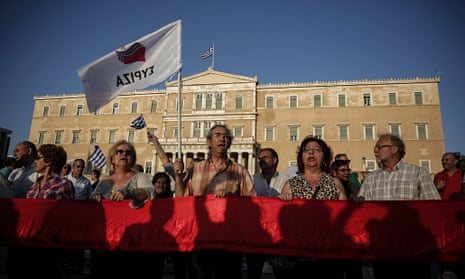I am not a natural Syriza voter, but the words and deeds of the EU towards Greece are enough to provoke me to sympathise with the Greek people and their government over austerity.
Greece has lost a quarter of its national income and output since 2007. That means, on average, a Greek citizen who was earning €10,000 (£7,000) in 2007 is today, after wage cuts, on €7,500 (£5,300). This is a crude average, so in practice many have suffered larger cuts as they have lost their jobs, or were on higher public sector pay, which has been cut more.
The joint approach of the EU and the IMF is to cut public spending, reduce public sector wages and pensions, and cut the public sector workforce. These IMF programmes to slim overgrown public sectors in problem countries are usually balanced by a devaluation of the currency to make private sector exporters more competitive and capable of winning extra work, and with a programme of suitable money relaxation to foster a general private sector-led recovery.
Trapped in the euro, Greece can neither devalue nor increase the money in circulation. As the public sector sheds jobs and cuts pay, there is no offsetting increase in private sector jobs for people to move to. Greece has ended up with a quarter of its workforce out of work, and with more than half its young people unable to find a job. No wonder the Greek people elected a new party to government and swept away the traditional parties of centre-left and centre-right that had engineered this economic disaster with the EU.
I feel passionately that if an economic policy creates mass unemployment and crushes living standards it should be changed. I tried to get big changes to the UK’s banking policy prior to and during the crash of 2007-08 for that reason. I ask myself where are the voices from the left condemning Greek austerity, when this severe austerity offends my sense of justice and hope for the future? Why are so many on the left mesmerised by the EU that they think austerity in its name is fine?
Worse still, where are the voices on the left who share my outrage that Greek democracy is overridden or ignored by the EU authorities? What part of the Greek condemnation of austerity policies did the EU not understand?
The left and I might not agree on what would propel Greece back to prosperity. What I think the remedy for the Greek economy might be is less relevant, as I am neither a voter nor an adviser to the government. Where we should agree is that the single-minded policy of cuts in the public sector, membership of the euro, strict monetary and banking controls, and an uncompetitive exchange rate is not working and needs revision.
Greece has an army around twice the size of the UK’s, with around one-sixth of the UK’s population. In normal times many might agree that is too large a burden on Greek taxpayers. These are not normal times. Few argue that now would be a good time to make soldiers redundant, when there aren’t any jobs for them to take up in the private sector.
I understand the views of the creditors, the IMF and the EU. The Greek state has borrowed too much and has entered into agreements it may not be able to keep. It has already walked away from money owed to private sector lenders. Official creditors want their money back and want Greece to adhere to the loan terms. They fear that if they let Greece off, others will want relief as well. I am no fan of people and states walking away from their debts either.
However the creditors need to grasp that they were foolish lenders, who lent too much on terms that did not allow Greece to repay. They needed to sort out a better way with Greece years ago. I remember writing to urge the IMF not to lend a cent to Greece, as it was obvious we needed changes of policy first. It went ahead, so now it has to recognise that some of the blame and some of the pain will rest with it. Instead of riding the moral high horse, it needs to walk in penance before European taxpayers and apologise for its folly.
With the UK’s banking crisis, people got mad with the banks for lending too much, rather than getting mad with the people and companies who could not pay the interest on their debts. The UK banks were brought down by bad regulation and some bad bankers, but only because many borrowers were unable or unwilling to meet their loan conditions. For reasons similar to here, Greek voters are more likely to get mad with the IMF and EU than they are with themselves for borrowing too much.
Were the EU truly democratic, or were it still an association of democratic states, it would listen to Greek voters – the voters who have already crushed the parties of government that presided over the crisis. The tragedy is that they seem to have no impact on the rest of the EU, which now holds the fate of the Greek people in its hands. It is not just the Greek economy that faces a major challenge, Greek democracy itself is on trial.
